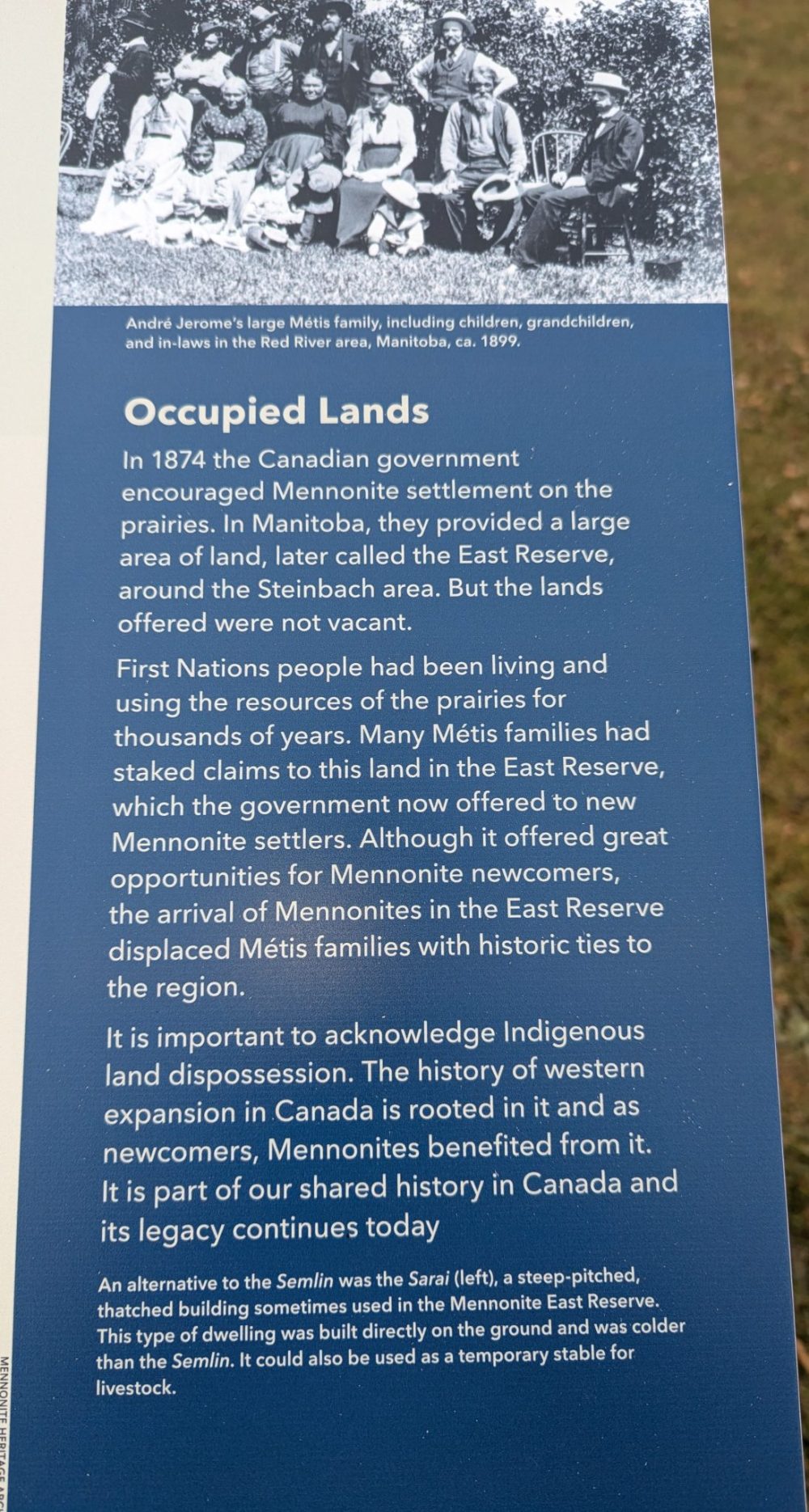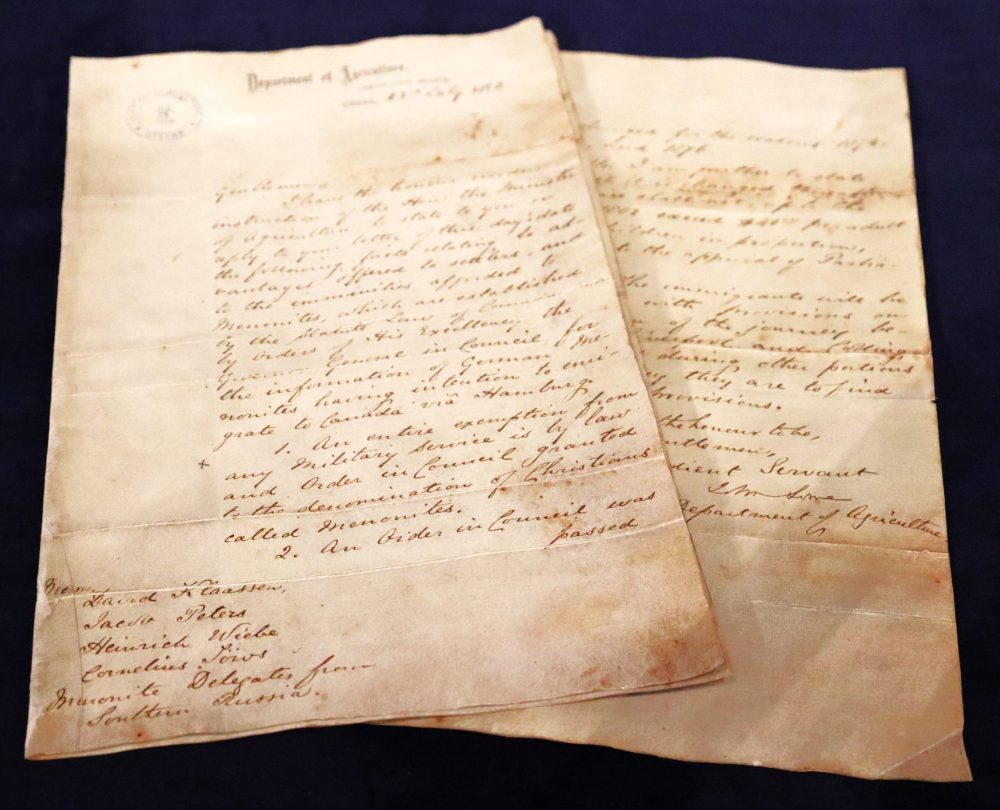COLUMN: Village News – The lasting impact of the Privilegium of 1873
Advertisement
The Privilegium of 1873, otherwise known as the Lowe Letter, is the reason Mennonites from Imperial Russia settled in Manitoba in significant numbers in 1874. An original copy of the letter, currently on display at the MHV, was found in the basement of the Christian Mennonite Church building in Steinbach in 2015. This letter offered a list of privileges extended to the Mennonites to induce them to consider Manitoba as their new home over the more developed regions in the United States. This document mostly deals with the privilege of free land acquisition and community organization, as well as the provision of travel support at a guaranteed cost within a prescribed timeframe. Clauses #1 and #10 lay out the most enticing reasons four of the 12 delegates chose Manitoba: “#1. An entire exemption from military service is by law and Order in Council granted to the Denomination of Christians called Mennonites” and “#10. The fullest privilege of exercising their religious principles is by law afforded without any kind of molestation or restriction whatever; and the same privilege extends to the education of their children in schools.” Of the Mennonite delegates, four were signatories to the agreement: David Klassen, Jacob Peters, Heinrich Wiebe and Cornelius Toews.
While the word privilegium (“special right or privilege”) may sound unfamiliar, the document is an agreement made between the Government of Canada and the prospective Mennonite settlers. Only two years prior, Treaty #1 was signed at the Stone Fort (Lower Fort Gary) with signatories Mis-koo-ke-new, Ka-ke-ka-penais, Na-sha-ke-penais, Na-na-wa-nanan, Ke-we-tay-ash, Wa-ko-wush, Os-za-we-kwun. It was clear from the negotiations that these seven signatories were not fully convinced, in contrast to our Mennonite ancestors, that the government was making these agreements in good faith for mutual benefit. While there are several dialects of the Cree language, belief in the binding power of treaty can be seen in words such as Naskomitôwin (“consent, assent; treaty”), a compound of the word asotamowin (“commitment, promise”). While the agreements of the numbered treaties and the Privilegium may have similar scope, the intent and outcome of these two commitments could not have been more different.
To highlight this difference, it is notable that the first agreement of Treaty 1, after the introductions and preamble, states that the people “inhabiting the district hereinafter described and defined do hereby cede, release, surrender and yield up to Her Majesty the Queen and successors forever all the lands included within the following limits…”, going on to describe the majority of the lands in southern Manitoba while allotting small reserves of land for Indigenous use. In contrast, Mennonites were granted a reserve and entitled to a quarter section of free land, the freedom to settle their own townships, and a “homestead right” over their land, without the requirement of surrendering anything in return. The creation of the Indian Act in 1876 and subsequent amendments in 1884 and 1895 led to the banning of most Indigenous sacred practices, in direct contrast to the freedoms afforded to Mennonites in privilege #10. Just as with the numbered treaties, the Government of Canada did not always fulfill their promises. The Privilegium made with the Mennonites had been amended before it was even passed as an Order in Council, rewording the statement to imply that other laws may supersede their rights to arranging their own education, a reality that hit home in 1916 with the passing of the Thornton Act making English the only language of instruction.

While this examination of two contemporaneous but very different agreements made by the Government of Canada is far too brief, it highlights something important for Mennonites in Manitoba. We are a people of privilege. Privilege does not mean that success is gained without effort or struggle, but rather that the systems and resources are in place to your benefit. Mennonites were granted large land allotments and had the opportunity to farm communally, allowing them to maximize land use and slowly transform the Manitoba landscape to their benefit. Where our Indigenous neighbours bound by Treaty 1 were forced into small reserves and told where they could live and settle their villages, Mennonites were granted freedom of movement (with many leaving to the preferred land of the West Reserve in the 1880s) and established many more than the eight original villages promised in the Priviligium. These privileges attracted nearly 7,000 Mennonite migrants, nearly three times the population of Winnipeg at the time, leading to a significant and lasting impact on the culture and politics of Manitoba. We can be thankful for the Privilegium document, as it highlights why Mennonites have done so well here in Manitoba, but with privilege comes a responsibility – to recognize these benefits, and seek to support and reconcile with communities who have been and who continue to be systemically oppressed.
Upcoming events
Secret Treaty Book Launch, Nov. 17, 2 p.m. (*New Time*). Join the MHV in launching Jonathan Dyck and Elder Dave Scott’s book, The Secret Treaty: A Lost Story of Ojibwe and Mennonite Neighbours. Share stories of the West Reserve before Mennonite Settlement and first encounters between Ojibway and latecomers. How do we forge a different way of sharing this land? To purchase tickets, please visit www.mhv.ca or mennochurch.mb.ca.
MHV Christmas Market, Nov. 9, 10 a.m. to 4 p.m. Peruse a variety of vendors in the MHV Auditorium and stock up on local gifts for Christmas. Admission is a Tin for the Bin for Southeast Helping Hands or cash donation. MHV Christmas Café with a hot lunch available onsite. There will be a children’s craft and wagon rides available for purchase and a special Village Books and Gifts door prize!
Where the Cottonwoods Grow viewing, Dec. 1, 2:30 p.m. Hosted by the Christian Mennonite Church, 479 Hanover St. Experience the story of Mennonite migration to Canada in 1874 and the difficult decisions and experiences of our Mennonite ancestors.

Winter in the Village, begins Dec. 3! Visit the village and enjoy the light displays, kicksleds, skating, snowshoeing and more. Join the MHV on Dec. 5 for the 150th Choral Celebration with Eastman Male Choir. Stay tuned to www.mhv.ca for workshops hosted throughout the winter.

